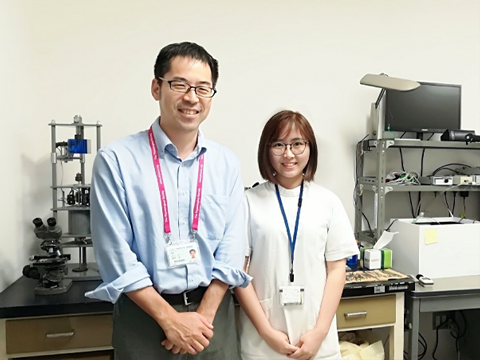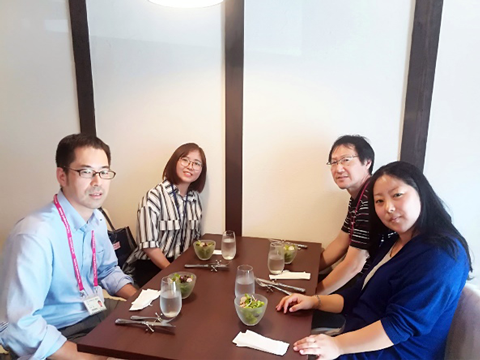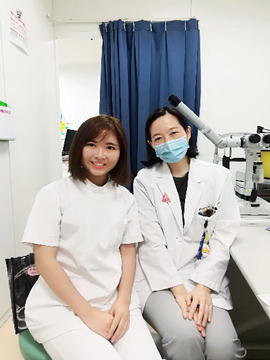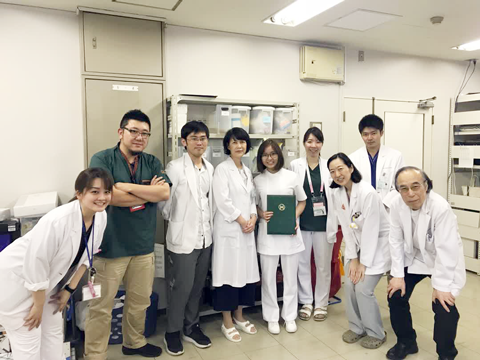国際・国内交流
周晓音(Zhou Xiaoyin)さん(汕頭大学医学院第4学年次)
Memorable Experience
The department I went for the first two weeks was the Physiology. My supervisor was Nakamura Teacher. On the first day, he showed me the laboratory and explained his experiments. He specially prepared PPT to introduce "learning and cognition," explaining the whole process of the memory, the hippocampus, the location of the perception and reason. And then he used mark pen to take notes on the blackboard, but we didn’t have brush tool, so he rubbed it directly with his hand, and finally his hand became so black and dirty, which impressed me deeply---what a responsible teacher!
The following experiment was the "Breathing and fear memory in the experiment cortex", I spent two days in "Handling animals", one day in "Training" and one day in "Text". Although the final results were not ideal, my teacher always analyzed the deficiencies of the whole experiment and the steps needed to be improved. One day my supervisor went on a business trip, so I followed another teacher, who explores the relationship between swallowing and the brain stem. This is my first time to do the experiment under a microscope, so I was very excited. Dissecting mice, separating nerves and arteries, all of them made me unforgettable.
After that, I continued to go back to my original experiment, conducting stereotactic injection, cutting the brain, and then freeing the brain. When I saw the transverse section of the mice’s brain under the microscope, I was amazed at the layers of the brain. On the last day of the laboratory, I went to the local restaurant with other people in the laboratory, we talked about all kinds of topics, from weather to culture, from food to language, and enjoyed the last day.
The next two weeks, I studied in the Ophthalmology department. On the first day, I went to the outpatient clinic with Dr. Takata to learn glaucoma and cataract. Although I could not understand the communication between the doctor and the patient, the doctor in the same room would explain and search the information, try their best to make me understand. The doctor-patient relationship here is really harmonious. For example, the doctor can spend half an hour in communicating with the patient, and the nurse can accompany the patient for each visit.
The following day, I took turns to the outpatient clinic and the operating room. Sometimes I studied ocular surface disease, and sometimes I studied ocular fundus disease. Dr. Fukuyama, who specializes in retinal diseases, would use his free time to tell me about diseases, image analysis, and show me the vitreous injection, retinal laser photocoagulation. Sometimes I followed him to the NICU for consultation.
In the operating room, each operation was performed under a microscope. The environment is very clean and neat. I watched the surgeries about glaucoma, cataract, strabismus, retinal detachment and so on. Sometimes, the operation assistant would help me explain the process of the whole operation. Once, he didn't have time to explain, so we made an appointment to solve it. Everyone is very responsible and enthusiastic.
Every Friday afternoon, the professor would go back to the hospital for consultation. The professor would check the patients one by one, and the resident doctor would report the diseases. The rest of the doctor would actively explain to me, so that I could learn better. On the last day of Ophthalmology, while waiting for the professor to issue the certificate, I suddenly received a gift from my professor, which was really amazing and moved. Finally, I took a picture with people in the department.
Four weeks of exchange life made me impressive, and the daily life was fruitful. This exchange activity not only broadened my horizon, but also enriched my study of medicine. Thanks my college and the Hyogo College of Medicine for giving this opportunity. I should study harder in the future and never forget my original intention.



